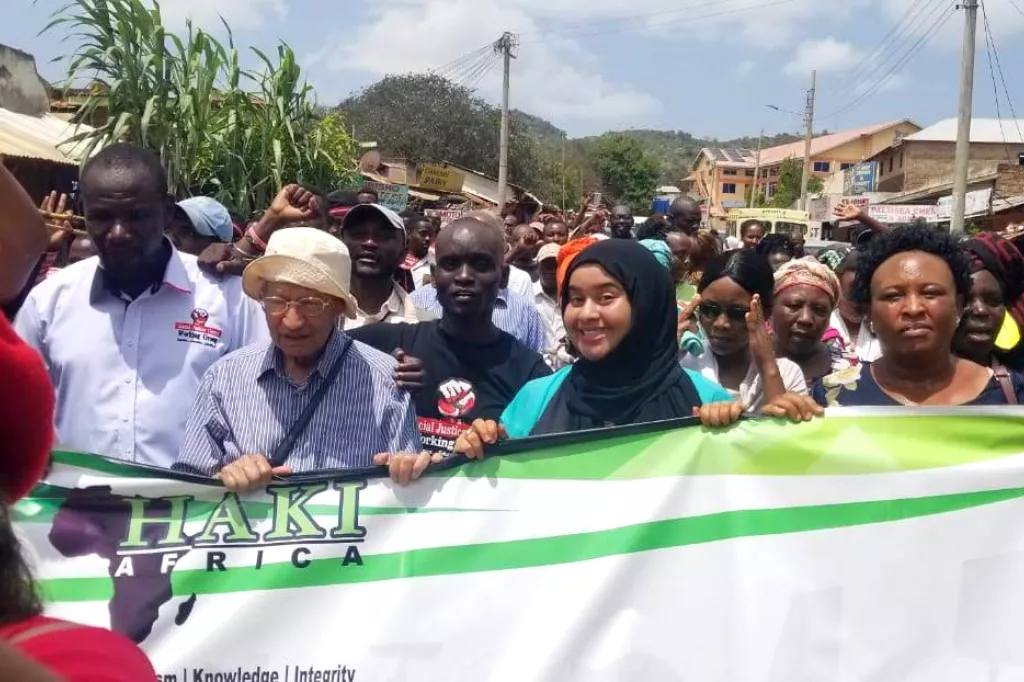Standing for Social Justice: Naila Abdallah

Photo: Naila Abdalla
Meet Naila Abdallah, a grassroots human rights and social justice activist in Mombasa, Kenya. Naila, our third social justice activist, serves as the team leader for Sisters for Justice, Mombasa Women Social Justice Centre, a young women-led organisation advocating for human rights in Kenya’s Coastal region.
Please describe your social justice work briefly.
I have a passion for human rights work, community empowerment, the rule of law, and social justice. Successful women human rights defenders like Mekatilili Wa Menza and Wangari Maathai have inspired me into this journey.
As a Muslim woman, I seek to change the narrative and break the cultural barriers that deny Muslim women opportunities to participate meaningfully in the development process to improve their wellbeing. I started my human rights work as a student leader in high school, and after that, I have been volunteering in various human rights organisations.
Human rights and social justice are unavoidably intertwined, and it’s impossible to have one without the other. Through human rights and social justice, I believe there will be fairness and equity across all aspects of life, such as community safety and security in society.
What cause is the most important for you, and why?
Women’s and youth’s rights in Mombasa remain a huge issue. Despite the few successes realised in empowering women and youth, numerous issues still exist in the county, ranging from cultural, political, social, and economic disenfranchisement, negatively affecting women and youth’s wellbeing. Unfortunately, the Covid-19 pandemic has exacerbated the situation and deeply entrenched women and youth rights violations, especially in the very homes that are meant to be safe havens for them.
How do you raise your voice to advocate for causes that matter?
As a community activist, I always engage in community organising through community forums, barazas, legal aid, radio shows, community dialogues between state and non-state actors’ members. If I get chances for a radio talk show and engagement, I optimise reaching out to wider audiences at the coast.
Through my grassroots rights activism in my community, I have empowered many young Muslim women whose rights have been violated to stand up and claim their rights. I have also been involved in advocating for access to justice for women cases in courts, gender-based violence cases, extrajudicial killings, violent extremism, and enforced disappearances.
Given your long-standing work, what key challenges do most social justice activists face?
Threats and intimidation are often especially by perpetrators who include both state and non-state actors regarding the numerous rights violations cases I handle. During COVID 19 pandemic, I risked my life participating in community service work and other Covid-19 mitigation measures, including food distribution with Kenya Red Cross.
Cases of extrajudicial killings, mob “justice,” and SGBV cases remain high in Mombasa. If this situation persists, the future of our women and youth looks bleak. I urge all social justice centres and civil society organisations to fight for human rights by all means, especially women and youth’s rights. I also call on the government to create a safe and conducive environment for human rights defenders and the rule of law and justice.
What accomplishments/ successes are you most proud of?
Over the last five years, I have been able to organise, empowered, and support our community in different activities such as public barazas that have been well-attended over 1000 participants from Mombasa. Besides, jointly with HAKI Africa, I have actively engaged in over 10 Legal Aids and 22 community dialogue forums targeting diverse participants from the community, civil society, national county governments to address various social injustices.
These forums further highlighted human rights violations and enhanced synergies and collaboration between state and non-state rights issues. I have also participated in Black Monday’s demonstrations and many other demonstrations to advocate for human rights and social justice in the Coast region.
I am an award winner of the Human Rights Defenders Award by the Kenya National Coalition of Human Rights Defenders. The award has motivated me to do more extraordinary things that I have not achieved yet as a human rights defender. I believe public recognition will legitimise my work again and get more support from my community. I also think that the award will help me connect with development partners who can advance my career.
What do you think is the importance of social justice in relation to development?
Human rights and social justice are unavoidably intertwined, and it’s impossible to have one without the other. Through human rights and social justice, I believe there will be fairness and equity across all aspects of life, such as community safety and security in society. Through social justice, there will be equity, participation, diversity, and human rights. I believe when all this is obtained; then social justice will be achieved.
World Day of Social Justice is an international day observed every year on February 20, recognising the need to promote social justice, which includes efforts to tackle poverty, exclusion, gender equality, unemployment, human rights, and social protections.
Beginning February 20, the World Day of Social Justice, we will be highlighting eight grassroots Social Justice Activists in Kenya, in recognition of their immense efforts and impact. These activists are committed to social justice, an underlying principle to promote inclusive development and respect for human rights.
Andra nyheter

The power of people powered Public-Private Partnerships
Public–Private Partnerships (PPPs) are often discussed in terms of roads, power plants, housing, and other large infrastructure projects. But as discussed on the People’s Partnership Podcast, PPPs are...

ForumCiv’s social media accounts labelled as “extremist materials” in Belarus
Important message to our Belarusian followers. Any interaction with our content can now lead to legal consequences in Belarus. Please read the information below and take the necessary precautions for...

ForumCiv enters new strategic partnership
ForumCiv is proud to announce a new three-year strategic partnership with Sida, totalling SEK 137 million.